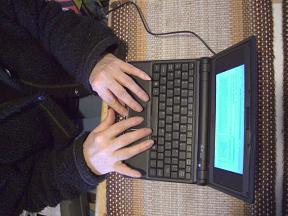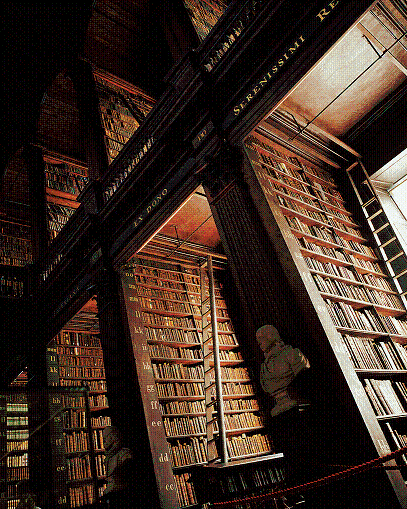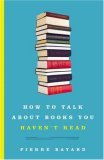December 19, 2007
I haven’t succumbed to the temptation of the Kindle: Amazon’s New Wireless Reading Device , partly because I’m afraid those quick book downloads at $9.99 or more could develop into an expensive habit (“crackberry” for bibliophiles?) – or else I’d be reading lots of free first-chapter samples. I have come across a couple of posts recently that delve into the Kindle in depth:
, partly because I’m afraid those quick book downloads at $9.99 or more could develop into an expensive habit (“crackberry” for bibliophiles?) – or else I’d be reading lots of free first-chapter samples. I have come across a couple of posts recently that delve into the Kindle in depth:
“Why Amazon’s Kindle is revolutionary” – looks at some of the Kindle’s lesser known features
“Getting serious about the Kindle” – Geoff Arnold reports on three weeks of using the device and a decision he recently faced over whether to buy a hardback or Kindle edition of a book.
Santa did stop by early to drop off an ASUS Eee (4G Surf model), which I’m using right now to type up this post! It’s a small but pretty full-featured “sub-notebook,” weighing under 2 lbs and costing less than $400. Though lacking a CD or DVD player it does have slots for an SD card and  two USB 2.0 ports. I’ll be able to slip it into my purse and carry it with me to read e-books, listen to music, watch movies, surf the web, play games and more. Our pet name for it is “Tripeee.”
two USB 2.0 ports. I’ll be able to slip it into my purse and carry it with me to read e-books, listen to music, watch movies, surf the web, play games and more. Our pet name for it is “Tripeee.”
Comments (0)
- reading
December 14, 2007
The “Library Problem” sounds like some kind of logic puzzle, but it’s actually the title of a wonderfully detailed post from Hackito Ergo Sum about organizing a home library, with lots of comments. This post was yesterday’s “Library Link of the Day” (12/12/07).
For the record I’ve used both LibraryThing and ReaderWare and can recommend both – ReaderWare is fine if you want a self-contained database on your computer; I’ve mentioned LibraryThing many times here – it’s a great web-based cataloging solution with lots of extra features, plus a good source of book information even if you don’t want to catalog your books there.

Comments (0)
- reading
December 9, 2007

In reading, one should notice and fondle details. There is nothing wrong about the moonshine of generalization when it comes after the sunny trifles of the book have been lovingly collected. If one begins with a ready-made generalization, one begins at the wrong end and travels away from the book before one has started to understand it. Nothing is more boring or more unfair to the author than starting to read, say, Madame Bovary, with the preconceived notion that it is a denunciation of the bourgeoisie. We should always remember that the work of art is invariably the creation of a new world, so that the first thing we should do is to study that new world as closely as possible, approaching it as something brand new, having no obvious connection with the worlds we already know. When this new world has been closely studied, then and only then let us examine its links with other worlds, other branches of knowledge.
— Vladimir Nabokov, “Good Readers and Good Writers,” from Reading in Bed: Personal Essays on the Glories of Reading selected & edited by Steven Gilbar
selected & edited by Steven Gilbar
Comments (0)
- reading
November 23, 2007
My practice is to read nonfiction books straight through, beginning to end – I like to immerse myself in the author’s flow of thought and argument. That is not the method recommended by Paul Edwards (from the University of Michigan School of Information) in the following article:
“How to Read: Strategies for Getting the Most out of Non-Fiction Reading” (links to a 7-page pdf)
He says: “So unless you’re stuck in prison with nothing else to do, NEVER read a non-fiction book from beginning to end.” Though I can’t agree with that, there are some good tips on reading strategies.
Theoretically related is this recent book about reading (or not reading):
How to Talk About Books You Haven’t Read by Pierre Bayard, which has been getting a lot of attention…
by Pierre Bayard, which has been getting a lot of attention…
 Complete Review has a great page full of links related to this title.
Complete Review has a great page full of links related to this title.
Comments (1)
- new books,reading
, partly because I’m afraid those quick book downloads at $9.99 or more could develop into an expensive habit (“crackberry” for bibliophiles?) – or else I’d be reading lots of free first-chapter samples. I have come across a couple of posts recently that delve into the Kindle in depth:
 two USB 2.0 ports. I’ll be able to slip it into my purse and carry it with me to read e-books, listen to music, watch movies, surf the web, play games and more. Our pet name for it is “Tripeee.”
two USB 2.0 ports. I’ll be able to slip it into my purse and carry it with me to read e-books, listen to music, watch movies, surf the web, play games and more. Our pet name for it is “Tripeee.”




